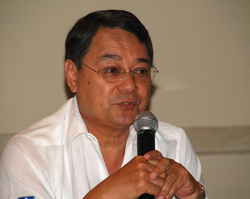 Honduras lies just about 1,000 miles southwest of Miami. A great location for commerce with the U.S. if you ask Antonio Young. Antonio is the Executive Vice President of FIDE, Honduras’ Foundation for Investment and Export Development. He says Honduras’ strategic location provides an invaluable access to Latin American markets. And, with the continued development of Honduras’ north-south highway, called the Logistic Corridor, Antonio says Honduras could be the dry land version of the Panama Canal.
Honduras lies just about 1,000 miles southwest of Miami. A great location for commerce with the U.S. if you ask Antonio Young. Antonio is the Executive Vice President of FIDE, Honduras’ Foundation for Investment and Export Development. He says Honduras’ strategic location provides an invaluable access to Latin American markets. And, with the continued development of Honduras’ north-south highway, called the Logistic Corridor, Antonio says Honduras could be the dry land version of the Panama Canal.
And, there are a lot of reasons why it should be, if you ask him. Antonio says the more than 70,000 square miles of tropical terrain and climate can support year-round cultivation and growth of an array of crops and produce. He says the country is a gem for agribusiness development because the government allows 100 percent foreign ownership, there are no import and export duties, there are no taxes on profit or profit repatriation and businesses can go online in as little as 21 days.
San Pedro Sula, Antonio says, is the hub of the country’s agribusiness. The city of nearly 1 million people is the country’s second largest, second to the Honduran capital Tegucigalpa.
With a total population nearing 8 million, Antonio adds that Honduras has a highly available workforce with many families seeking second and even third sources of income.
Antonio says Honduras is already the second largest exporter of Tilapia to the U.S. He says freshly caught fish can leave Honduras’ Puerto Cortes seaport and arrive in the U.S. in as little as 6 hours. The seaport of Puerto Cortes is unmatched in Latin America for Antonio. He says the port is a model for security in the Americas because of its Container Safety Initiative or CSI. The initiative, he explains, safeguards against terrorism. Plus, he says Puerto Cortes is the most efficient deep sea seaport in Central America.
I spoke with Antonio briefly about why he thinks Honduras represents great opportunity in U.S. agribusiness investment. You can listen to my interview here: antonio-young-honduras08.mp3
